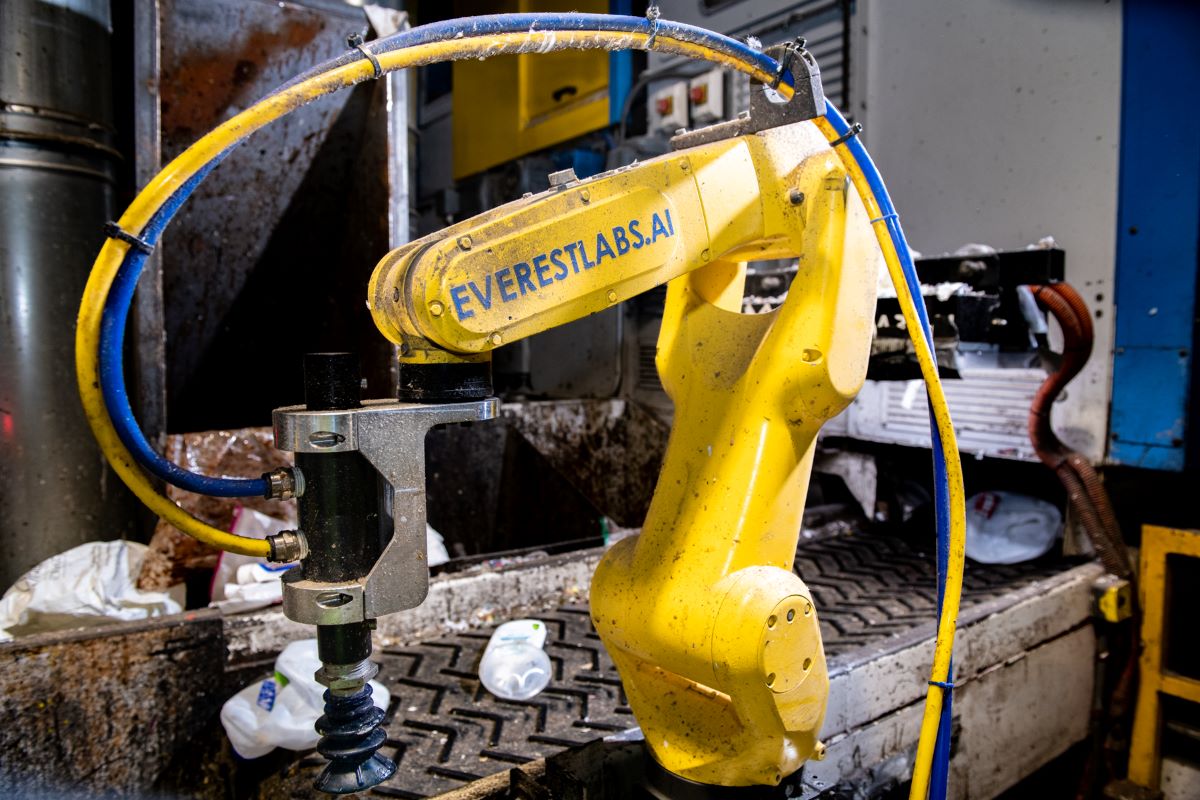
About 20% of EverestLabs’ AI-powered robotic systems are installed at plastics reclaimers. | Courtesy of EverestLabs
A fast-growing recycling robotics company is finding particular success marketing to plastics reclaimers, which are using the systems to sort scrap material from lower-grade bales, a company leader said.
“[On] the reclaimer side of the business, there’s really clever business cases that the reclaimers can do with robotics that’s helping us get more traction there,” said Apurba Pradhan, head of product and marketing for EverestLabs.
In an interview with Plastics Recycling Update, Pradhan discussed how the Fremont, Calif.-based company has been commercializing its AI robotics and systems for capturing data on recyclables.
Like other recycling robot companies, EverestLabs uses cameras powered by AI software, identifying materials on a conveyor belt based on their appearance. The system can catalog everything it sees and, if integrated with a robotic arm, pick specific desired or unwanted items.
Founded in 2018, EverestLabs had its first sale two years ago. Already, the company has sold over 50 systems, most of them over the past year, said Pradhan, who joined the company only last year. Roughly 80% of them are located in materials recovery facilities (MRFs), which sort through the curbside recycling mix. But the remaining 20% are working at plastics reclaimers.
EverestLabs has publicly disclosed adoption by one plastics reclaimer, KW Plastics.
Pradhan said the reclaimer market, which has the robots working on PET, HDPE and PP lines, is growing faster than the MRF market, even as EverestLabs signs deals with some major MRF operators, including Republic Services. The robots allow reclaimers to buy cheaper, low-grade bales and clean them up so they can still produce high-quality recycled resin, he said.
“The value is apparent to them,” he said. “That part of the business is picking up for us faster than it is the MRFs.”
A economic ‘no-brainer’
EverestLabs has had a number of successes over the past year. Among those was a deal with Republic Services, the second-largest garbage and recycling company in North America. EverestLabs briefly mentioned that it was working with Republic in February 2023, at the same time it announced partnerships with West Coast hauler and MRF operator Recology, San Francisco Bay Area-hauler Alameda County Industries, and Pacific Northwest MRF operator Pioneer Recycling Services.
In May, EverestLabs again highlighted its deal with Republic, at the time also mentioning reclaimer KW Plastics, Southwest U.S. garbage and recycling company Universal Waste Systems (UWS), and Sims Municipal Recycling (SMR), which operates one of the nation’s largest and most advanced MRFs in Brooklyn, N.Y. (SMR is part of Closed Loop Partners’ Circular Services division).
EverestLabs is far from the first AI-powered robot company to enter the recycling business.
Among the larger U.S. robot players are Denver-based AMP Robotics, Eugene, Ore.-headquartered Bulk Handling Systems (BHS) and Plessisville, Quebec-based Machinex, all of which have been selling systems to MRFs and other recycling facilities for several years. Those other facilities have included a number of PET recycling plants.
Using its technologies, AMP is also operating its own secondary-sorting facilities, where bales from MRFs are further sorted into a number of material categories.
EverestLabs’ systems are different from the delta-style robots that most others have rolled out at MRFs around the country. Delta-style robots have three arms suspended above a belt, making them look almost like a spider. (Both BHS and AMP also offer different types of robots for special applications.)
The six-axis arm robots that EverestLabs leases are slower than their delta counterparts, but Pradhan said their percentage of successful picks is higher – typically around 90%. They’re also quicker to install, and their maintenance costs are lower, he said.
For EverestLabs, the robot conversation is focused on MRFs’ last-chance lines, where all facilities are losing some amount of valuable commodities to disposal. With a cost that’s “much less than $100,000 a year,” the robots’ return on investment can be seen in as little as three months, Pradhan said.
“Economically, it’s really a no-brainer at this point,” he said.

